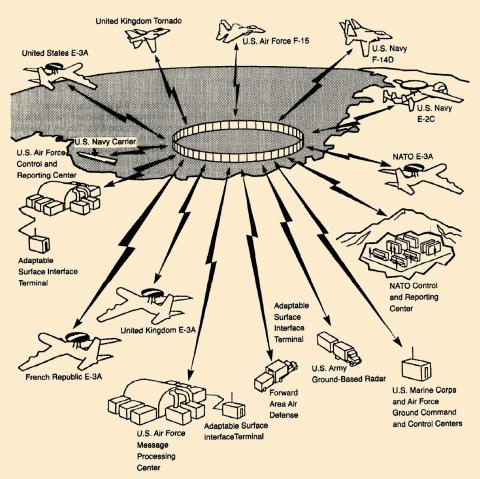A deal to purchase an upgraded naval vessel communications system worth NT$2.15 billion (US$68.18 million) has been finalized with the US government, a high-ranking Taiwanese military officer said yesterday.
The officer, who declined to be named, said the deal secured the purchase of upgraded Link-16 and Link-11 systems, which would connect the Republic of China (ROC) Navy directly to the command center for the US’ Pacific fleet.
The system will give the ROC Navy the ability to share coordinates and other information with the US Seventh Fleet during combat operations, the officer said, adding that the move ties the two navies closer together.

Image in the public domain provided by Wikimedia Commons
The systems are already in use by NATO members and the US’ other allies in the Pacific, the officer said, adding that information can be shared among all allies during combat operations should the need arise.
The US can direct all of its allies in the field to coordinate operations, the officer said.
The officer said some of the ROC Navy’s ships would use the Link-16 system, which will connect those ships to other vessels, land-based radar systems and other military installations.
Kidd-class destroyers, Cheng Kung-class frigates, Lafayette-class frigates and Knox-class frigates would all use the Link-16 system, the officer said, adding that missile-equipped patrol ships and support vessels would use the Link-11 system, which only connects with other vessels.
The officer said the deal was rushed through with coordination between the American Institute in Taiwan and military representatives stationed in the US, adding that shipment and installation of the systems are expected to be completed by June 2021.
The officer said that while the systems’ main components are to be acquired from the US, communications and photoelectric components would be produced by domestic manufacturers.
Democratic Progressive Party (DPP) Legislator Lo Chih-cheng (羅致政) said that control over information is at the heart of armed conflict.
An effective means to transmit information is fundamental to military strategy, Lo said, adding that the procurement of the Link-16 and Link-11 systems would greatly benefit the nation’s military.
DPP Legislator Wang Ding-yu (王定宇) said the process of military cooperation with allies in the region began late last year when Taiwan, Japan and the US communicated military aircraft identifier signal information with each other, adding that Japan included contingencies for a possible conflict in the Taiwan Strait among recent training activities.
Outcomes in modern military conflicts are decided within seconds, Wang said, adding that the systems would dramatically improve the military’s reaction time and allow for rapid coordination of movements.
Additional reporting by Aaron Tu

The CIA has a message for Chinese government officials worried about their place in Chinese President Xi Jinping’s (習近平) government: Come work with us. The agency released two Mandarin-language videos on social media on Thursday inviting disgruntled officials to contact the CIA. The recruitment videos posted on YouTube and X racked up more than 5 million views combined in their first day. The outreach comes as CIA Director John Ratcliffe has vowed to boost the agency’s use of intelligence from human sources and its focus on China, which has recently targeted US officials with its own espionage operations. The videos are “aimed at

STEADFAST FRIEND: The bills encourage increased Taiwan-US engagement and address China’s distortion of UN Resolution 2758 to isolate Taiwan internationally The Presidential Office yesterday thanked the US House of Representatives for unanimously passing two Taiwan-related bills highlighting its solid support for Taiwan’s democracy and global participation, and for deepening bilateral relations. One of the bills, the Taiwan Assurance Implementation Act, requires the US Department of State to periodically review its guidelines for engagement with Taiwan, and report to the US Congress on the guidelines and plans to lift self-imposed limitations on US-Taiwan engagement. The other bill is the Taiwan International Solidarity Act, which clarifies that UN Resolution 2758 does not address the issue of the representation of Taiwan or its people in

US Indo-Pacific Commander Admiral Samuel Paparo on Friday expressed concern over the rate at which China is diversifying its military exercises, the Financial Times (FT) reported on Saturday. “The rates of change on the depth and breadth of their exercises is the one non-linear effect that I’ve seen in the last year that wakes me up at night or keeps me up at night,” Paparo was quoted by FT as saying while attending the annual Sedona Forum at the McCain Institute in Arizona. Paparo also expressed concern over the speed with which China was expanding its military. While the US

SHIFT: Taiwan’s better-than-expected first-quarter GDP and signs of weakness in the US have driven global capital back to emerging markets, the central bank head said The central bank yesterday blamed market speculation for the steep rise in the local currency, and urged exporters and financial institutions to stay calm and stop panic sell-offs to avoid hurting their own profitability. The nation’s top monetary policymaker said that it would step in, if necessary, to maintain order and stability in the foreign exchange market. The remarks came as the NT dollar yesterday closed up NT$0.919 to NT$30.145 against the US dollar in Taipei trading, after rising as high as NT$29.59 in intraday trading. The local currency has surged 5.85 percent against the greenback over the past two sessions, central